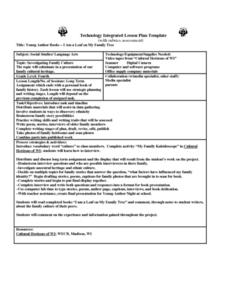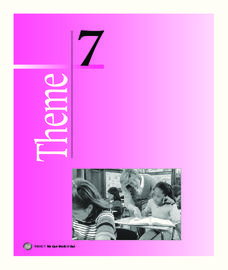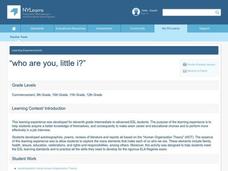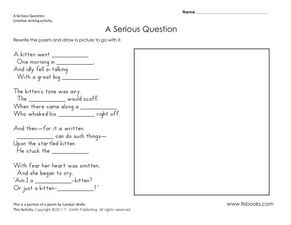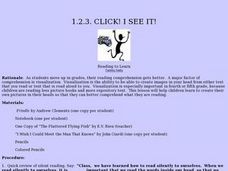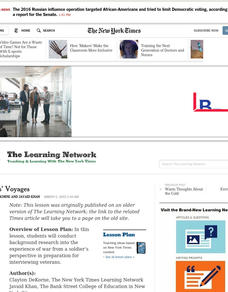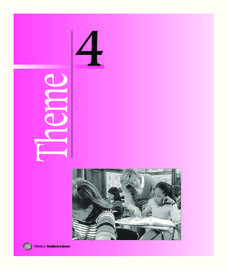Curated OER
Poems and Translation (from Spanish to English)
Students read and are read various poems in their native language of Spanish. In groups or individually, they translate the poems into English and practice speaking English by reading them to the class. They answer comprehension...
Curated OER
Young Author Books: I Am a Leaf on My Family Tree
Fourth graders create family tree books. They discuss culture and brainstorm interview questions for family members. They write stories, poems, and captions for family photos. They interview family members and assemble the interviews...
Curated OER
Mesearch: A Reason for Research
Students complete a research activity about themselves. They access an article on brainstorming and identifying personality traits. Students brainstorm about their personality traits and view a related PowerPoint. Students create their...
Curated OER
Classroom Unity Representing a Nation of Immigrants
Investigate national unity in a month-long lesson. After creating "I am from" poems, 5th graders will construct accordion flip books, listing and illustrating reasons for settlement. Choosing illustrations, essays, or Powerpoint...
Curated OER
Reading Comprehension: "I Build Walls"
In this poetry comprehension worksheet, students read a poem called "I Build Walls" and think about the symbolism. Students answer 5 interpretation questions about the poem.
Bulgarian Creative Writing Competition
Creative Writing Prompts For Every Season and Month
Winter, spring, summer, and fall! Every season is covered in a 14-page list of writing prompts. Included are story starters, reflection questions, poetry topics, and more.
Poetry4kids
Twenty Fun Writing Prompts for Kids
Twenty prompts reinforce scholars' writing skills of essays and poems. Prompts cover topics such as superpowers, holidays, the weather, and more!
Houghton Mifflin Harcourt
We Can Work It Out: English Language Development Lessons (Theme 7)
Listen, look, speak, and move are the routine steps of the English language development lessons found in a We Can Work It Out themed unit. Language proficiency is reinforced through picture cards, poems, and grand discussions about...
Curated OER
Language Arts: Lewin Project
Fourth graders read and respond to the poem, "When I Am Angry." They complete surveys by analyzing the most common feeling and draw a bar graph of their behavior, using different colors to identify the duration of various feelings. ...
Curated OER
Who Are You?
Students explore the concept of self and analyze the Human Organization Theory. Individually, students write poems about themselves. In small groups, they create a poster related to the 14 categories of the Human Organization Theory....
Curated OER
Discovering Ourselves in Literature and Life
Students read literature and view other media to discover how print and non-print texts answer the thematic question: Who am I? students compare the ways ideas are presented, and create their own portfolios or personal Web pages...
Curated OER
Poetry Through the Eyes of An Actor
Students examine the ways poetry has been used by actors. After reading a poem, they discuss the characters and the differences in how the male and female students view them. In groups, they read a few of Shakespeare's sonnets and write...
Curated OER
A Serious Question
In this creative writing worksheet, students read a poem about a kitten called "A Serious Question" by Carolyn Wells. Students rewrite the poem, filling in the blanks with different words on their own.
Curated OER
1.2.3. Click! I See It!
Students listen as the teacher reads the poem 'I Wish I Could Meet the Man That Knows' by John Ciardi. They share what they visualized as the teacher read the poem. They practice reading the book "Frindle" silently while creating...
Curated OER
Past and Present New York Through A Comparative Study of Photography and Poetry
Learners study New York in three time periods, 1890-1930, 1930's, and 1950's-60's. They discuss themes that are important in each time block. They describe a brief historical picture of each time period before they approach works of...
Curated OER
Veterans' Voyages
Introduce your middle and high schoolers to a different perspective on war: that of soldier's. Read Guisseppi Ungaretti's poem "Vigil" to kick-start this instructional activity. After discussing his perspective, read "The Screaming...
Bully Free Systems
Bully Free Lesson Plans—Eighth Grade
Middle schoolers are likely very familiar with the concept of bullying and cliques. Discuss their experiences and brainstorm ways to handle peer conflict and feelings of exclusion with a poem that focuses on bullying, and a second...
Curated OER
All About Me from A-Z
Use the letters of the alphabet as prompts for autobiographical poems.
University of Kentucky
Bullying Awareness
As a teacher, it's likely you're seeing bullying at your school in some capacity. Use three activities as a refresher course for junior high schoolers on what bullying is, the severity of its consequences, and how they can make a...
Curated OER
Introduce Vocabulary: Ruby the Copycat (Rathmann)
Have your scholars ever known someone who was a copycat? Approach this issue as you study vocabulary in context by reading Peggy Rathmann's book Ruby the Copycat. Proposed focus words are: recite, murmur,...
Curated OER
Lesson: Double Album: The Collection and the Archive
An open discussion starts this lesson off. The class takes a critical look at five works of art that demonstrate the impact and purpose of identity through collections or archives. They then write a list or draw 10-15 items found in...
Houghton Mifflin Harcourt
Problem Solvers: English Language Development Lessons (Theme 4)
How can you teach a text to a group of readers who struggling with the language? The second in a set of three ESL lessons related to Theme 4: Problem Solvers engages English language learners by introducing vocabulary and grammar...
Houghton Mifflin Harcourt
Family and Friends: English Language Development Lessons (Theme 4)
Family and Friends is the theme of a unit consisting of English language development lessons. Reinforce language proficiency, particularly in family vocabulary, basic needs, feelings, short vowel sounds, blending, reading high frequency...
Houghton Mifflin Harcourt
Nature: Friend and Foe: English Language Development Lessons (Theme 6)
If readers don't understand key portions of a text, it may seem more like a foe than a friend. The second resource in a series of three ESL lessons designed to accompany the texts in Nature: Friend or Foe makes the texts easier to...



